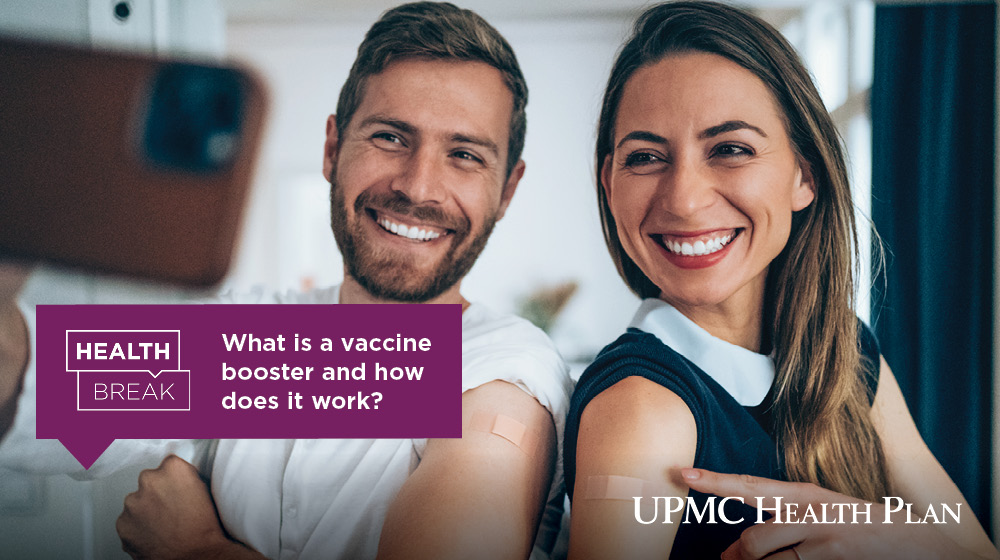Health Break: What is a vaccine booster and how does it work?

A podcast for UPMC Health Plan members, Health Break is your quick guide to caring for your mental and physical health, prioritizing wellness, and making the most of your health insurance plan.
Episode 22: Take a Health Break with Dr. Maria Guyette
Why do some vaccines require booster shots, and when should people get a COVID-19 booster? Dr. Maria Guyette takes a Health Break to explain.
Episode transcript:
Camille: Welcome to Health Break by UPMC Health Plan, your quick guide to health, wellness, and how to make the most of your health insurance plan. I’m your host, Dr. Camille Clarke-Smith. I help to oversee the quality of the plans and programs we offer at UPMC Health Plan.
Angelo: And I’m your co-host, Angelo Bartic. I’m a health coach who works with our members on making healthy lifestyle habits and setting goals. This is your…Health Break.
Hi, it’s Angelo Bartic. Today we’ll find out what a vaccine booster is and how it works. Dr. Maria Guyette breaks down the basics and tells us what we need to know about when to get a booster and why. Dr. Guyette, thank you so much for spending some time with us today.
Dr. Guyette: Thanks so much for having me.
Angelo: So to get started, can you explain—what is a vaccine booster?
Dr. Guyette: I sure can. We have been hearing a lot about COVID boosters these days, so it’s a good time to talk about boosters in general. Before we talk about boosters, let’s take a step back and talk about what a vaccine does. A vaccine helps prevent disease. We use vaccines for infectious diseases or diseases that can be passed from person to person like viruses and bacteria. The work of fighting an infection typically falls to your body’s immune system, and it turns out that your body’s immune system is pretty good at that. A vaccine helps your body’s immune response by getting it ready for a specific virus or bacteria so it knows what it’s looking for. And then when it actually sees that bug in real life, there is no ramp-up period for your body to fight back. It is already ready to go. But your body does slowly forget that bug it saw. It has a lot of other things to remember. So a booster shot is a repeat vaccine to help your body remember how to fight that virus or bacteria. Every vaccine has an initial vaccination series, which could be one, two, or three doses to get your immune system optimally primed, and then that additional dose it needs periodically to help boost your immune system. That’s what we call a booster.
Angelo: So why do some vaccines require boosters while others don’t?
Dr. Guyette: Our goal overall is to use vaccines that are safe and effective and the COVID vaccine is a great example. The CDC data shows that they are safe and effective, but it also shows that they get less effective with time. Your immune system memory fades with time. So we watch antibody levels to figure out how well your immune system will be able to respond. And since we’re talking about recommending boosters for a large number of people, what scientists do is look at the levels of antibodies in a large number of people to determine when we need to get a booster dose. The science around vaccines is always developing, so it’s not just looking at the initial part of how effective and safe vaccines are. It’s also looking at how long does that effectiveness last for and do we need any more?
Angelo: Speaking of COVID, we know that updated COVID-19 boosters are available, but how do we know if we should get one?
Dr. Guyette: Let’s talk about the bivalent COVID booster. COVID-19 has been changing over the past three years, and the dominant variants are different now than they were when we first got the vaccine. Over the summer of 2022, a bivalent booster was introduced, which includes protection against the omicron variant. The bivalent boosters are recommended for everyone who has gotten the primary series, regardless of how many other boosters you got along the way. Some people had more boosters than others because of their age and immunocompromised health. The bivalent booster should be given at least two months after your most recent COVID shot, whether you are starting your primary series now or whether you have already gotten the original boosters. The bivalent booster has been really important to help protect against the recent strains of COVID. To figure out for yourself if you are due for a COVID booster search, “CDC, should I get a booster?” You can see all the latest information and take a quiz specific to you.
Angelo: Thank you so much Dr. Guyette for taking a Health Break with us today, talking about vaccine boosters and what we need to keep in mind when it comes to COVID-19 boosters.
Dr. Guyette: Thanks again for having me.
Angelo: Talk with your PCP about your eligibility for a booster, and visit our COVID-19 website for details about how to schedule a COVID-19 booster.
Find show notes and more information at upmchealthplan.com/podcast. Join us as we continue exploring health, wellness, and how to make the most of your health insurance plan in the next episode of Health Break.
This podcast is for informational and educational purposes. It is not medical care or advice. Individuals in need of medical care should consult their personal care provider. Views and opinions expressed by the hosts and guests are solely their own and do not necessarily reflect those of UPMC Health Plan and its employees.
Related to this episode:
- COVID-19 vaccine recommendations from the CDC
- COVID-19 vaccine information from UPMC
- COVID-19 information for UPMC Health Plan members
About Dr. Maria Guyette:
Maria Koenig Guyette, MD, is an emergency physician caring for patients at UPMC Shadyside Emergency Department, and a senior medical director for the UPMC Health Plan caring for the population health of UPMC Community HealthChoices participants. She is an associate professor on the faculty of the University of Pittsburgh School of Medicine, where she teaches residents and medical students about health policy, advocacy, equity, and health systems.




